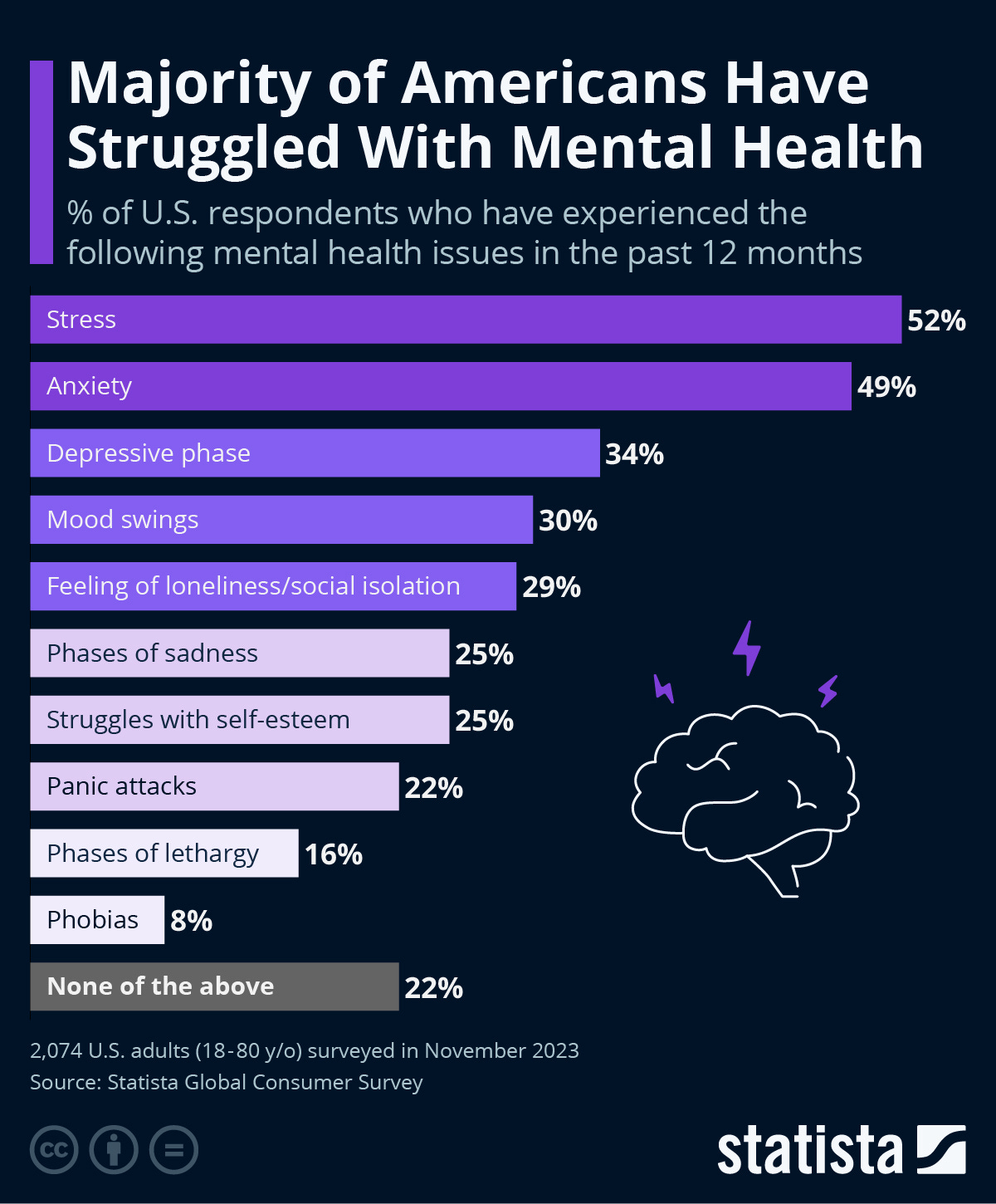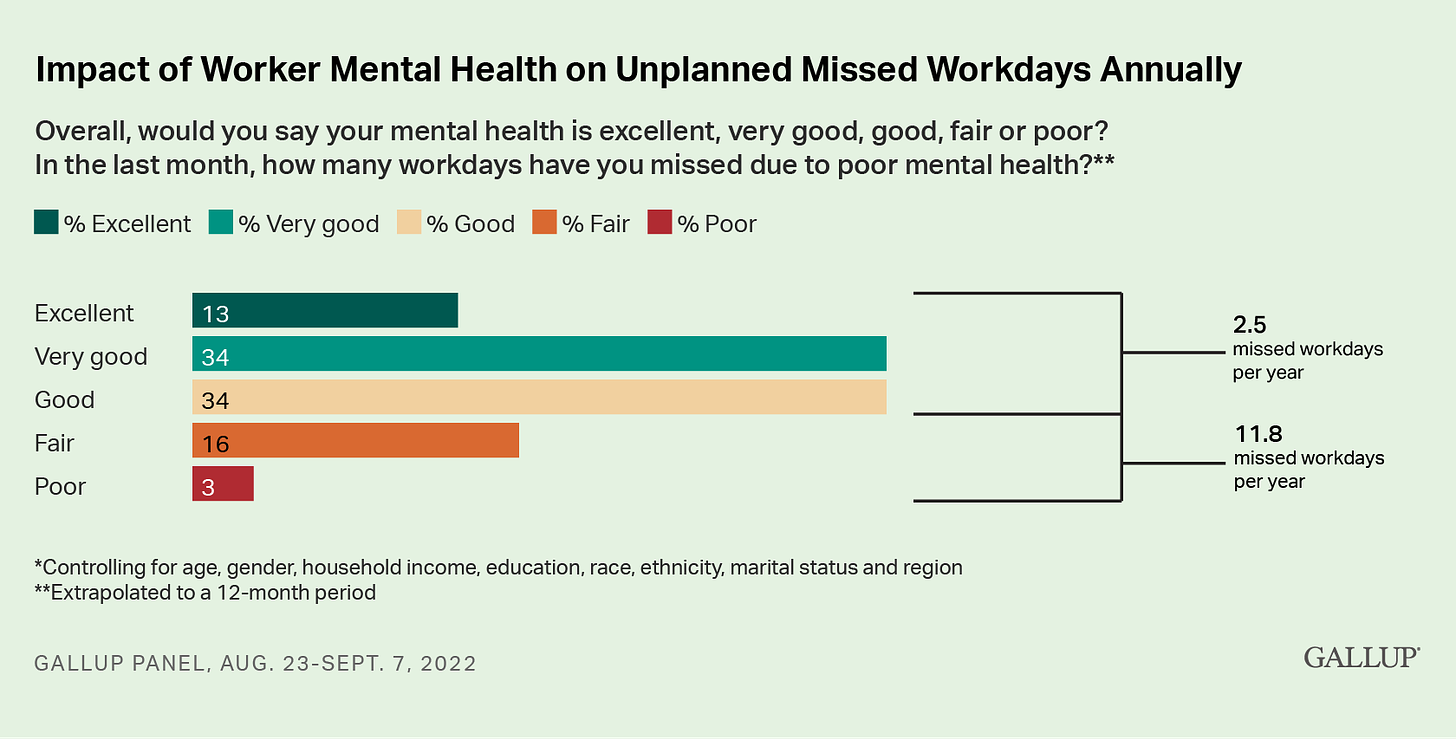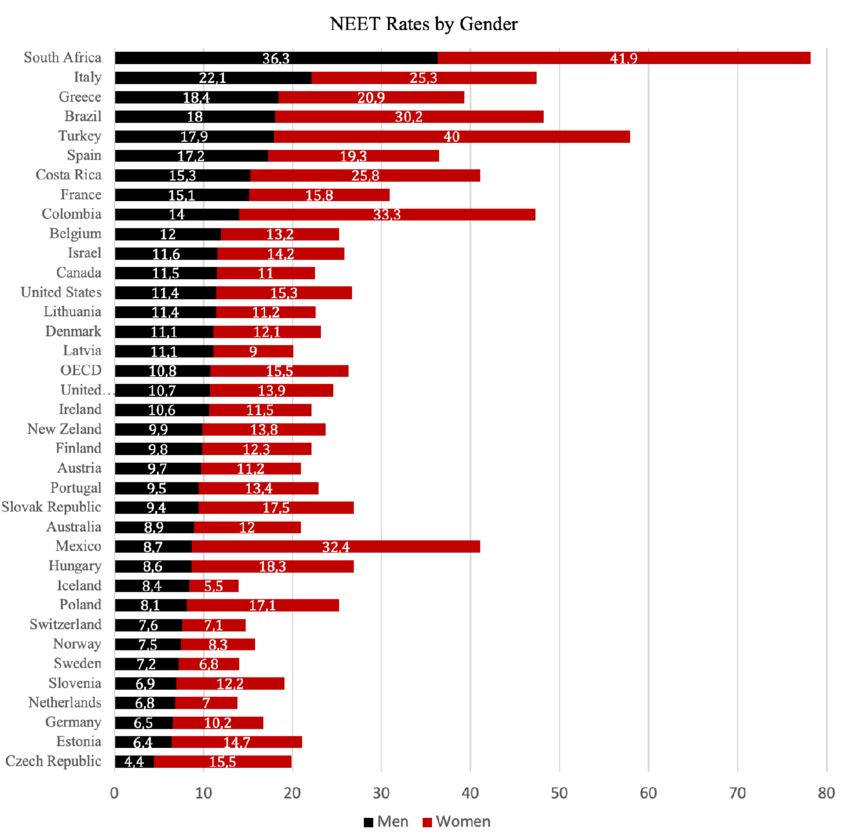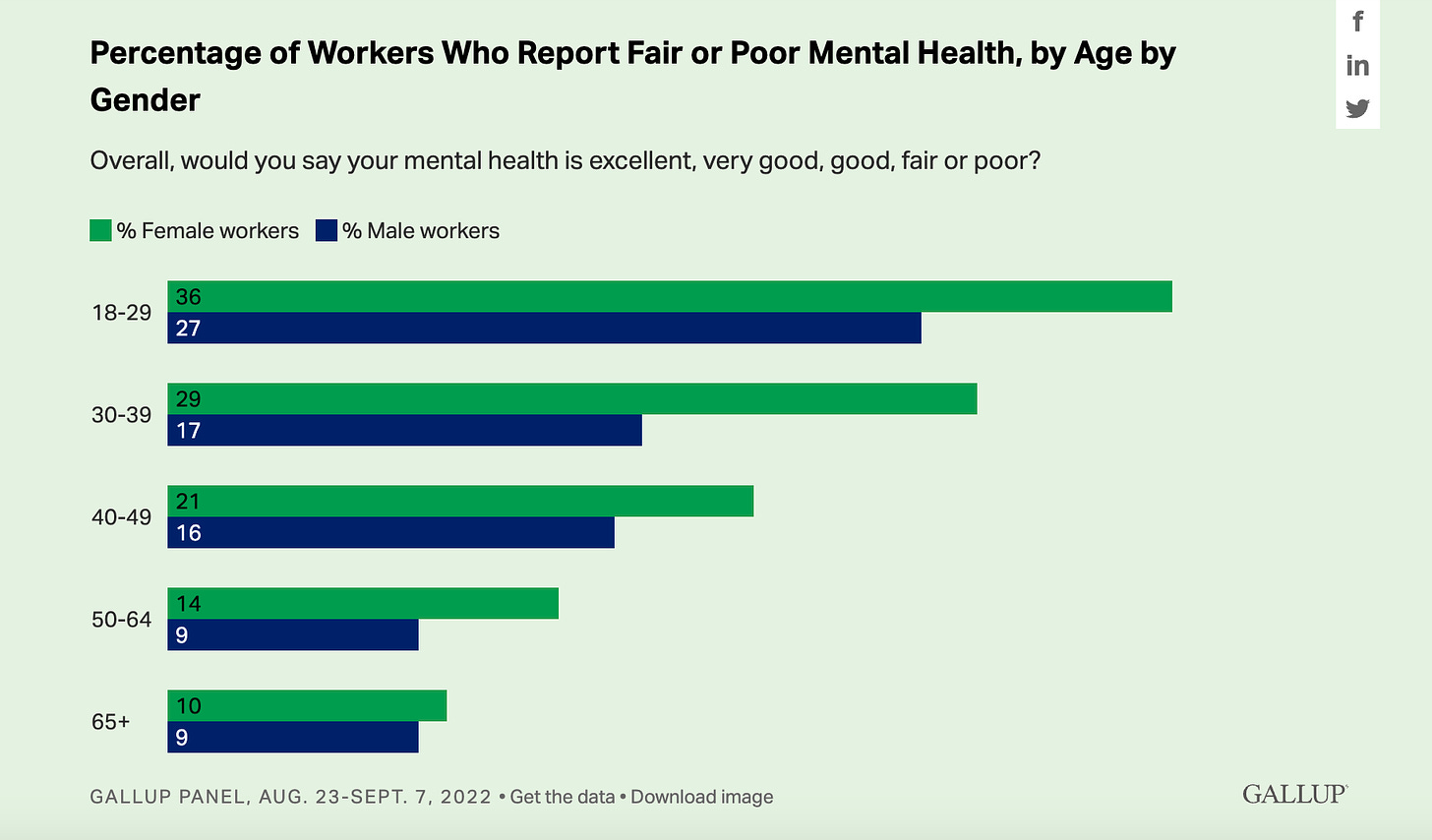EP96: Broken Minds, Broken Nation: The Economic and Geopolitical Fallout of America’s Mental Health Crisis
NEET Nation: The Mental Health Crisis Behind America's Workforce Decline
TL;DR
The U.S. is experiencing a significant mental health crisis affecting individuals, communities, and the nation's global standing. With nearly 60 million adults experiencing mental illness and youth depressive symptoms rising, the crisis has led to reduced productivity, higher healthcare costs, and a growing NEET (Not in Education, Employment, or Training) rate, exacerbating labor shortages. Combined with declining fertility rates, this poses severe economic and geopolitical challenges, weakening innovation and U.S. influence globally. Addressing these intertwined issues requires urgent and strategic reforms in mental health care, economic policy, and social support systems to prevent further internal and international decline.
Introduction:
The United States is currently grappling with what many experts describe as a significant mental health crisis, impacting individuals, communities, and the nation's standing on the global stage. This paper seeks to explore the existence of this crisis, substantiate it with statistical evidence, analyze its economic and productivity implications, and consider its potential trajectory and geopolitical consequences.
A mental health crisis in America
There is substantial consensus among experts and the public that the United States is facing a mental health crisis. A CNN/Kaiser Family Foundation poll indicated that 90% of Americans believe the country is in the midst of such a crisis, highlighting a broad recognition of mental health issues as a national concern. This perception is not only anecdotal but is supported by alarming trends in mental health indicators. Numerous studies and statistics underline the severity of the mental health crisis in the U.S. The National Survey on Drug Use and Health (NSDUH) noted that in 2021-2022, 23% of adults experienced a mental illness within the past year, equating to nearly 60 million Americans. The CDC's Youth Mental Health Survey has shown increases in depressive symptoms among high school students, with 42% reporting persistent feelings of sadness or hopelessness in 2021, up from prior years. Additionally, the KFF/CNN survey revealed that half of American adults report having experienced a severe mental health crisis within their family, including issues like self-harm or substance abuse. These statistics are complemented by reports from Mental Health America, which annually ranks states on mental health access and outcomes, consistently highlighting a worsening trend.
Impact on America efficiency, productivity and economy
The mental health crisis significantly influences productivity and the economy. Mental health issues lead to decreased work efficiency, increased absenteeism, and higher healthcare costs. A study published in JAMA Network Open found that adults with depression are at a higher risk of dying from cardiovascular diseases, which in turn affects workforce productivity. Moreover, the economic cost of untreated mental illness in the U.S. is substantial, with estimates suggesting that mental disorders account for billions in lost productivity each year due to absenteeism and presenteeism (working while unwell). The lack of access to care, as highlighted by a study by the Cohen Veterans Network, exacerbates these economic impacts by preventing timely and effective treatment. Given current trends, it appears likely that the economic toll due to mental health issues could increase unless significant interventions are implemented. The ongoing societal stressors, including those from climate change, social media, and geopolitical tensions, suggest that mental health challenges will not abate without concerted efforts. The Surgeon General's advisory on youth mental health warns of long-term impacts if these issues are not addressed, potentially leading to a more significant economic burden in the future due to a less healthy workforce. Furthermore, without expanding mental health services and addressing social determinants like education and employment, the cycle of mental health decline and economic loss could intensify.
The Rise of the US NEET Rate:
The rise of the NEET (Not in Education, Employment, or Training) rate in the United States has been increasingly recognized as a significant social and economic issue, closely intertwined with the nation's mental health crisis. Here, we explore this linkage and assess the degree to which mental health impacts the NEET phenomenon. The NEET rate among young people in the U.S. has seen a notable increase over recent years. While exact national figures fluctuate, global comparisons and regional studies indicate a concerning trend. For instance, the OECD reported that the U.S. had about 14% of its youth population aged 16 to 24 as NEETs in recent years. This figure, though somewhat lower than in some other countries, reflects a growing concern, particularly as it has been associated with long-term economic and social implications. A significant number of NEETs in the U.S. and globally cite mental health issues as a primary reason for their status. Studies, including those from the U.K., have shown that mental health problems like depression and anxiety are prevalent among NEET youth, with about one in four NEET respondents in surveys attributing their lack of engagement to mental health concerns. The relationship between being NEET and poor mental health can be bidirectional. On one hand, mental health conditions can lead to disengagement from education and work, as individuals might find it challenging to manage the demands of these environments. On the other hand, the lack of structured daily activities, social isolation, and economic insecurity associated with being NEET can exacerbate or lead to mental health issues. This creates a feedback loop where mental health deteriorates further due to inactivity, which then perpetuates the NEET status. Research from the National Survey on Drug Use and Health (NSDUH) has shown that NEET adolescents and young adults are at higher risk for adverse health outcomes, including poor mental health. For instance, NEET individuals report poor or fair health at rates significantly higher than their employed or studying counterparts. A study from 2016-2018 involving about 53,690 respondents indicated that NEET status was associated with higher rates of self-reported poor health, which often correlates with mental health issues.
The degree to which mental health impacts the NEET rate can be inferred from the prevalence of mental health conditions among this demographic. Around 21% of young people in the U.K., where similar socio-economic conditions apply, reported a worsening of their mental health in the last year, correlating with their NEET status. This suggests a substantial portion of NEETs might be dealing with mental health challenges. Long-term studies indicate that early exits from education or employment due to mental health can lead to chronic NEET status, with individuals finding it increasingly difficult to re-enter the workforce or education system. This long-term disengagement can lead to further mental health decline, illustrating a severe and deepening impact. The mental health-NEET nexus also has broader economic implications. The loss of productivity, the cost of untreated mental health conditions, and the long-term economic dependency of NEET individuals due to their health status contribute significantly to the economic burden of the mental health crisis.
Mental health issues among the NEET population reduce productivity, both through direct losses (absenteeism, reduced work hours) and indirect effects (lower motivation, reduced innovation). The economic cost of untreated mental illness is already significant, with estimates suggesting billions lost each year due to decreased productivity.
In conclusion, the rise in the U.S. NEET rate is closely linked to mental health issues, where the relationship is not only correlational but also potentially causal. The degree of impact is substantial, affecting not just individual well-being but also having ripple effects on the economy and society. Addressing this requires integrated approaches that focus on both mental health support and pathways back into education or employment to break the cycle.
NEET rate in combination with demographic decline makes for headwinds for the US
Alongside these issues, the U.S. has experienced demographic shifts, with fertility rates dropping to historic lows (1.64 children per woman in 2020, below the replacement level of 2.1). An aging population, coupled with fewer young people entering the workforce, poses challenges for economic growth and sustainability. This demographic shift is intertwined with mental health, as stress from economic and social pressures can influence decisions about family planning and career progression. An aging workforce with fewer young entrants means a shrinking labor pool. The NEET rate largely due to the mental health crisis exacerbates this by removing a segment of the potential workforce from active participation, leading to labor shortages in sectors critical for economic growth like technology, healthcare, and skilled trades
The international geopolitical impacts of America's mental health crisis
The mental health crisis in the U.S. has several geopolitical implications. Internationally, the perception of U.S. stability and reliability might be affected, as mental health is increasingly recognized as a key component of national security and resilience. The U.S.'s ability to lead in global health initiatives or respond effectively to international crises could be compromised if domestic mental health issues continue to strain resources and attention. Moreover, the crisis can influence foreign policy, particularly in areas like international aid, where mental health support is becoming more critical, as seen in responses to global conflicts. The crisis might also lead to a decrease in U.S. soft power, as other nations look to the U.S. for leadership in health and social policy. If the U.S. struggles to manage its own mental health crisis, this could diminish its influence in setting global standards or leading international health organizations.
As the U.S. grapples with these internal issues, its ability to project power and influence on the global stage might diminish. Economic strength underpins geopolitical influence, and with productivity and population growth compromised, the U.S. might face challenges in maintaining its leadership in international organizations and military commitments. A workforce that is less engaged or healthy can hamper innovation, which is vital for maintaining competitiveness in fields like technology and science. This could lead to a relative decline in U.S. technological leadership, affecting its geopolitical stance in an era where tech dominance is key.
The convergence of a rising NEET rate, a mental health crisis, and demographic decline presents significant challenges for the United States. These issues not only threaten internal economic stability but also the nation's geopolitical standing. Addressing this triad requires a strategic, multi-pronged approach to safeguard America's future on both domestic and international fronts.
Conclusion:
The mental health crisis in America is not only a domestic issue but one with far-reaching implications for economic productivity and international relations. Addressing this crisis requires a multi-faceted approach, involving policy reforms, increased investment in mental health infrastructure, and a focus on social determinants. Without such interventions, the U.S. risks not only internal economic and social decline but also a weakened position on the global stage.
Sources:
https://www.pewtrusts.org/en/trend/archive/fall-2023/americas-mental-health-crisis
https://www.thenationalcouncil.org/news/lack-of-access-root-cause-mental-health-crisis-in-america/
https://mhanational.org/issues/state-mental-health-america
https://www.nami.org/about-mental-illness/mental-health-by-the-numbers/
https://time.com/6308096/therapy-mental-health-worse-us/
https://www.cdc.gov/mental-health/about/what-cdc-is-doing.html
https://www.projecthope.org/news-stories/story/the-global-mental-health-crisis-10-numbers-to-note/
https://mhanational.org/
https://www.theepochtimes.com/article/americas-anxiety-crisis-affecting-1-in-every-6-adults-5726334
https://www.who.int/news-room/fact-sheets/detail/mental-health-strengthening-our-response
http://www.mhapbc.org/index.cfm?ArticleId=124&fuseaction=news.details
https://homenewshere.com/national/health/article_a11554a6-0817-5c70-b626-fb4a4a44e525.html
https://globalaffairs.org/bluemarble/why-youth-neets-rise-worldwide-mental-health-cost-of-living
https://www.cnn.com/2022/10/05/health/cnn-kff-mental-health-poll-wellness/index.html
https://ijpds.org/article/view/561
https://pmc.ncbi.nlm.nih.gov/articles/PMC5339976/
https://www.sciencedaily.com/releases/2015/09/150921112512.htm








